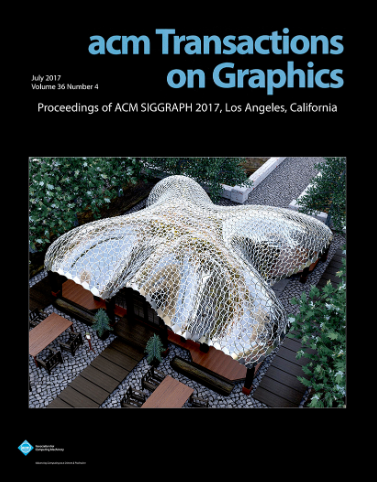SymX:基于符号表达式的能量模拟
IF 9.5
1区 计算机科学
Q1 COMPUTER SCIENCE, SOFTWARE ENGINEERING
引用次数: 0
摘要
优化时间积分器可以有效地解决复杂的多物理场问题,包括具有非线性材料模型的变形固体、摩擦接触、应变极限等。对于具有挑战性的问题,通常使用牛顿型优化器,这需要全局非线性目标函数的一阶和二阶导数。手动区分、实现、测试、优化和维护结果代码非常耗时,容易出错,并且妨碍了对模型的快速更改,即使在使用辅助处理此类管道部分的工具时也是如此。我们介绍了SymX,一个开源框架,通过符号微分计算不同能量贡献的所需导数,生成优化代码,实时编译,并执行全局汇编。用户只需要在其相应的离散化中为单个代表性元素提供每个能量的符号表达式,我们的系统将确定整个模拟的组合导数。我们展示了SymX在复杂模拟中的多功能性,包括不同的非线性材料、高阶有限元、刚体系统、自适应离散化、摩擦接触和多个相互作用物理系统的耦合。SymX的衍生产品提供了与SymPy相当的性能,SymPy是一个现成的符号引擎,并且产生的模拟速度至少比TinyAD快一个数量级,TinyAD是一种替代的最先进的集成解决方案。本文章由计算机程序翻译,如有差异,请以英文原文为准。
SymX: Energy-based Simulation from Symbolic Expressions
Optimization time integrators are effective at solving complex multi-physics problems including deformable solids with non-linear material models, contact with friction, strain limiting, etc. For challenging problems, Newton-type optimizers are often used, which necessitates first- and second-order derivatives of the global non-linear objective function. Manually differentiating, implementing, testing, optimizing, and maintaining the resulting code is extremely time-consuming, error-prone, and precludes quick changes to the model, even when using tools that assist with parts of such pipeline. We present SymX, an open source framework that computes the required derivatives of the different energy contributions by symbolic differentiation, generates optimized code, compiles it on-the-fly, and performs the global assembly. The user only has to provide the symbolic expression of each energy for a single representative element in its corresponding discretization and our system will determine the assembled derivatives for the whole simulation. We demonstrate the versatility of SymX in complex simulations featuring different non-linear materials, high-order finite elements, rigid body systems, adaptive discretizations, frictional contact, and coupling of multiple interacting physical systems. SymX’s derivatives offer performance on par with SymPy, an established off-the-shelf symbolic engine, and produces simulations at least one order of magnitude faster than TinyAD, an alternative state-of-the-art integral solution.
求助全文
通过发布文献求助,成功后即可免费获取论文全文。
去求助
来源期刊

ACM Transactions on Graphics
工程技术-计算机:软件工程
CiteScore
14.30
自引率
25.80%
发文量
193
审稿时长
12 months
期刊介绍:
ACM Transactions on Graphics (TOG) is a peer-reviewed scientific journal that aims to disseminate the latest findings of note in the field of computer graphics. It has been published since 1982 by the Association for Computing Machinery. Starting in 2003, all papers accepted for presentation at the annual SIGGRAPH conference are printed in a special summer issue of the journal.
 求助内容:
求助内容: 应助结果提醒方式:
应助结果提醒方式:


